3 Key Elements to a Great Cup of Coffee
When it comes to brewing coffee, there are 3 key elements that will make or break your brew. These elements are water, grind size, as well as roasting. Let’s take a closer look at each. Although it may seem complicated, these factors are actually quite easy. You can get great tasting coffee in just a few simple steps.
Water
Water is one of the most important elements to a great cup of coffee. It is rich in natural minerals and aromatic substances. These compounds give coffee its unique taste, aroma, and mouthfeel. These compounds can only be extracted from the bean if the water is soft and free from metallicions. The ion exchange process, which replaces minerals with sodium, can help remove these impurities.
Magnesium is a sticky mineral that is often found in hardwater. This mineral binds to the caffeine in coffee, giving it stronger flavor. High levels of magnesium can also cause bitterness in coffee. A balance of magnesium, calcium and coffee is the best.
Water also plays a big part in the brewing process. Water temperature is another important factor. Coffee should be brewed with water between 195 and205 degrees Fahrenheit. If you want your coffee to taste great, filter the water before you brew it.
Diversity
A new study has found that coffee is best when there are many different types of coffee. The coffee tree originated as a single plant, but today, there are millions of cultivars in the intertropical belt. This is a great thing for coffee lovers.
Diversity in the workplace can have many benefits for employees as well as the company. It helps employees solve problems and generate new ideas. It builds a company’s reputation, attracts talent, and helps to solve problems. For example, according to the Boston Consulting Group, companies with diverse management teams generate 19 percent more revenue from innovation.
Coffee breeding programs aim to exploit genetic diversity to satisfy farmers’ needs. Arabica is not compatible with many of the methods used to breed other crops. As such, breeders may need to look to closely related species in the Coffea family to find sufficient genetic diversity. Modern breeding methods may also be used to introduce new diversity.

Roasting
The roasting process of a coffee bean has a significant impact on the taste, acidity, smoothness, and mouthfeel of the coffee. It also affects the natural essence of the coffee beans. A skilled roaster will know how to manipulate the roasting process in order to achieve the desired flavor profile.
Roasting is a complex process that involves chemical reactions. Each reaction’s intensity depends on the bean’s temperature. Different roasting methods can produce different aromas and flavors. The flavor profile of each coffee varies greatly. The right roasting process can dramatically improve the flavor of a cup.
The color of the coffee bean changes from green to yellow or brown as it is roasted. The remaining moisture in the seeds starts to evaporate and is no longer contained within the bean. The coffee begins cracking when this happens. This sound is known as the first crack. It helps the roaster guide the batch.
Grind size
It is essential to use the correct size grind for a great cup. The time it takes for the coffee to dissolve in the water will be affected by the size of the grind. This will impact the flavor and aroma of your brewed coffee.
There are three major types of coffee grind sizes: coarse, medium, and fine. Each one is essential for getting the best taste and aroma from your coffee. Adjusting the grind size can make a big difference in the final product. The coarsest grind size works best in French presses and percolators. Medium grind size is great for drip coffees and Chemex machines.
The grind size determines how much flavor is extracted from the coffee. Small particles extract more quickly, while coarse particles extract more slowly. Medium to coarse grind size is ideal for espresso, drip coffee, and pour over coffee. However, extra coarse grind size is better for coffees that require long brewing times.
